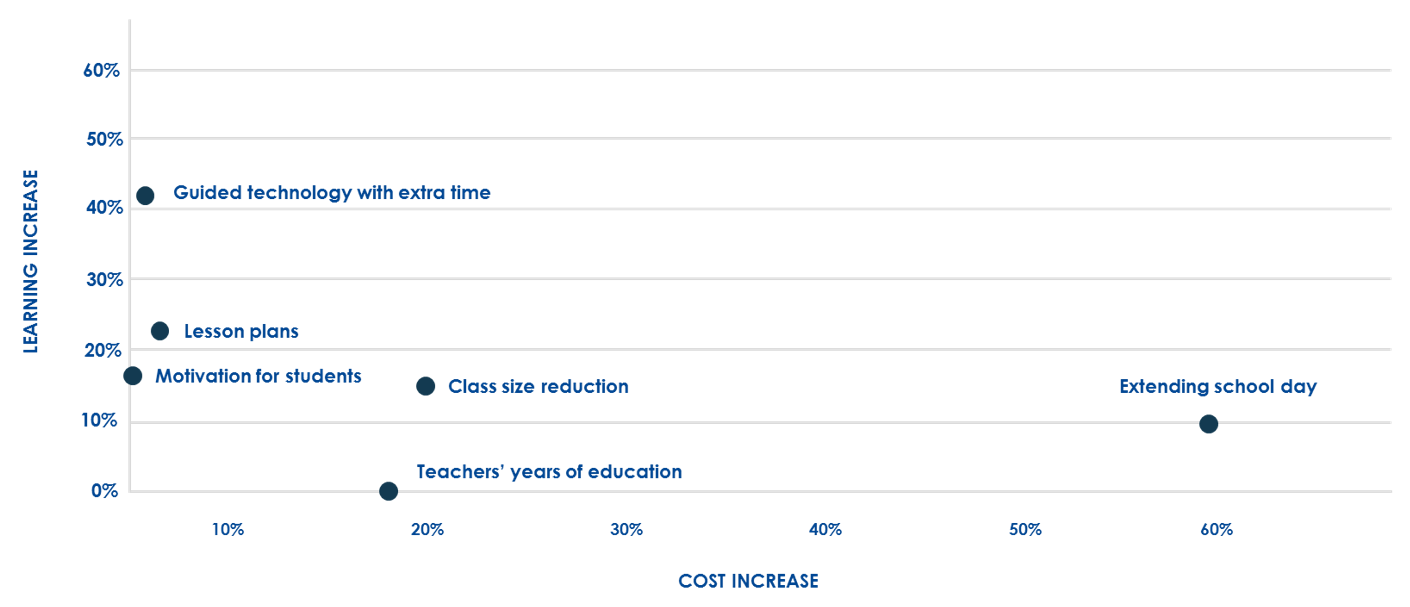Improving skills amongst children and adults alike requires an evidence-based approach to policymaking rather than intuition and theory, argue Mattias Busso, Julian Cristia, Diana Hincapié, Julián Messina and Laura Ripani (Inter-American Development Bank).
Latin America and the Caribbean urgently needs to tackle its lacklustre productivity growth. The first decade of this century was good for the region. Fuelled by historic highs in commodity prices, the region grew quickly and unemployment, poverty, and inequality fell. Yet, the productivity gap with the rest of the world grew larger rather than smaller. Since it is by now that skills are fundamental for productivity, skills-development policies must become the cornerstone of efforts to close this gap.

But even in today’s changing world of work, where it remains difficult to predict the kinds of jobs that will be required in future, one thing is certain: to take advantage of any new labour-market opportunities, people will need to be both well prepared and versatile. Skills-development policies should also help close the gap between those who began life with disadvantages and those who enjoyed better opportunities.
Our research for the Inter-American Development Bank’s new flagship report Learning Better: Public Policy for Skills Development aims precisely to help governments address these issues by providing detailed, evidence-based analysis of what works and what doesn’t.
The skills gap in Latin America and the Caribbean
The need to improve skills in the region is pressing, as we lag behind not only the developed world, but also countries of similar GDP-per-capita in other world regions.
Consider skills during childhood (Figure 1, Panel A). Only 30 per cent of fourth graders in the region achieve a minimum standard of basic maths skills. They cannot add and subtract whole numbers, recognise parallel or perpendicular lines, or understand maps. In contrast, 95 per cent of fourth grade students in the United States and 66 per cent in countries with levels of development similar to Latin America and the Caribbean reach this low benchmark. International comparisons amongst adolescents and adults show similar gaps.
Figure 1. Skills Gaps in Latin America and the Caribbean
Panel A. Comparing Learning in Latin America With the Rest of the World

Panel B. Skills Gaps between High- and Low-income Families over the Life-cycle

Figure 1, Panel B shows that steep socioeconomic gradients in skills development start during early childhood and never close. A child born into a high-income household scores between 40 and 60 points higher on standardised tests measuring socioemotional, cognitive, and language skills than a child born into a low-income household. During childhood, this translates into a delay of more than a year of schooling, which widens to almost two years during adolescence. Not surprisingly, adults born to mothers with low educational levels earn 30 per cent less than adults born to educated mothers. Skills gaps do not close in the region.
How to improve skills? The need for evidence-based policies
Improving the skills of children and adults alike demands more than intuition and theory. It requires that governments in Latin America and the Caribbean adopt an evidence-based approach to policymaking.
This means using empirical results to guide decisions when weighing up different policy options. It means designing pilot projects, evaluating them properly, and scaling them up only when they prove cost-effective.
Fortunately, there is a growing body of evidence on what works and what doesn’t. Since the year 2000 the number of available experimental evaluations of skills-development policies grew from 30 to more than 1100. This is encouraging, but this body of evidence is dwarfed by the 35,000 experimental results available in public health, for example.
To facilitate access to this important evidence, we conducted a series of meta-analyses to identify, harmonise, and summarise high-quality studies. The resulting SkillsBank web resource provides information on effect sizes of different programmes, as well as details of intervention, context, and methods. This information reveals some important conclusions.
Leaving no one behind
Effective skills-development policies must start today, with active workers, by identifying demand from the productive sector and translating these needs into changes in education and training systems.
Firms are important actors for skills development, as more productive firms help their workers build careers and invest in skills relevant to the economy. A study focusing on Chile shows that when young workers first access the labour market through high-productivity firms, their wages grow faster than in less productive enterprises. Less-educated workers also benefit from joining highly productive firms, helping them to close their skills gaps.
Public policy can help workers with less-favourable backgrounds access highly productive firms. Several youth programmes that bundle short training periods with internships in firms have proven to be effective in boosting access to formal jobs and higher wages, while also passing the cost-effectiveness threshold (Figure 2). This calls for more ambitious programs that involve longer training periods co-designed and co-executed with the private sector. Apprenticeship programmes, for example, work well in other regions of the world but have rarely been explored in Latin America and the Caribbean.
Figure 2. Impact of Several “Jovenes” Programmes on Wages and Formality

But policies should not stop at supporting active workers. Skills gaps must be attacked early, because the earlier skills are developed, the better individuals do later in life.
Skills-development policies can help to improve parenting from day one of children’s lives. Such programmes are rare, but their results are promising. One well-known Jamaican stimulation study reveals how one simple intervention — health workers made weekly visits to poor families to show parents how stimulation with basic toys makes a big difference — had large knock-on effects on children’s IQ, maths, and language skills, not to mention wages later in life . When the program was implemented in other contexts, it again showed positive results, reducing cognitive-skills gaps between poor and rich kids by almost 70 per cent. Other parenting programs also showed large effects at low cost (Figure 3).
Figure 3. Parenting Programs Substantially Reduce Cognitive Skills Gaps between Rich and Poor Kids
Impact vs cost: when impact is not enough to direct public policy
Developing academic skills in maths and language is fundamental to many jobs and careers. Will using information on costs and benefits allow policymakers to improve learning during childhood? The available evidence suggests that it will.
Over the last 15 years, governments have channelled substantial resources to three policies: reducing class size, extending the school day, and increasing teachers’ years of education.
Some of these policies have been effective. Reducing class sizes from 25 to 20 students increases yearly learning by 15 per cent, whereas extending the school day from 4 to 7 hours produces a 10 per cent gain (see Figure 4). Increasing teachers’ years of education, meanwhile, has had no clear effect. But all three policies are expensive, requiring increases in spending: about 20 per cent for class size and teachers’ years of education, and a whopping 60 per cent for extending the school day.
But there are many other innovative and cost-effective policies that appear to be off governments’ radars.
- Non-monetary incentives – reading competitions, say, or informing students about the high returns of educational qualifications – can boost students’ effort by simple and inexpensive means.
- Teachers can be provided with lesson plans to save their precious time and ensure that instruction is effective and engaging.
- Technology can be used in a guided manner during additional instruction to exploit its comparative advantages for learning.
All of these policies generate important increases (20-40%) in yearly learning via annual cost increases of only 2 per cent each, and similar possibilities exist for boosting socioemotional and cognitive skills among adolescents and adults. The key point is that prioritising cost-effective interventions allows governments to improve outcomes with even limited increases in spending.
Figure 4. Contrasting Costs and Impacts to Improve Learning in Elementary School
But these are just a few of the many cost-effective interventions that could be implemented to boost skills. There are many more, and at every stage of the life cycle, from early childhood to adulthood. Another swathe of promising policies also needs to be evaluated fully before being scaled up to increase their impact.
Of course, the size of the skills gap in Latin America and the Caribbean means that this is no small challenge. But evidence-based public policy is the beginning of the solution.
Notes:
• The views expressed here are of the authors rather than the Centre or the LSE
• This article draws on the IDB’s recent report Learning Better: Public Policy for Skills Development
• Please read our Comments Policy before commenting







